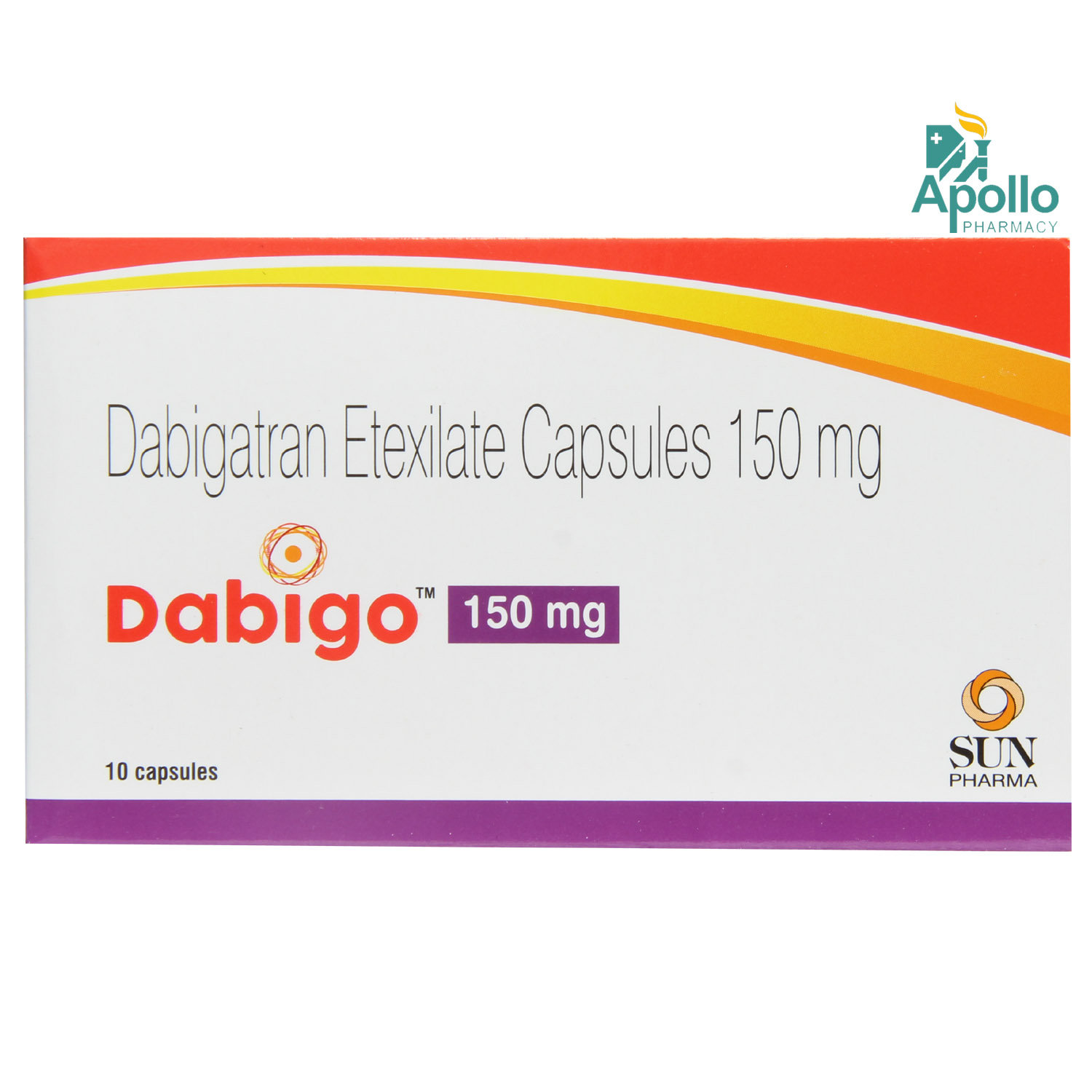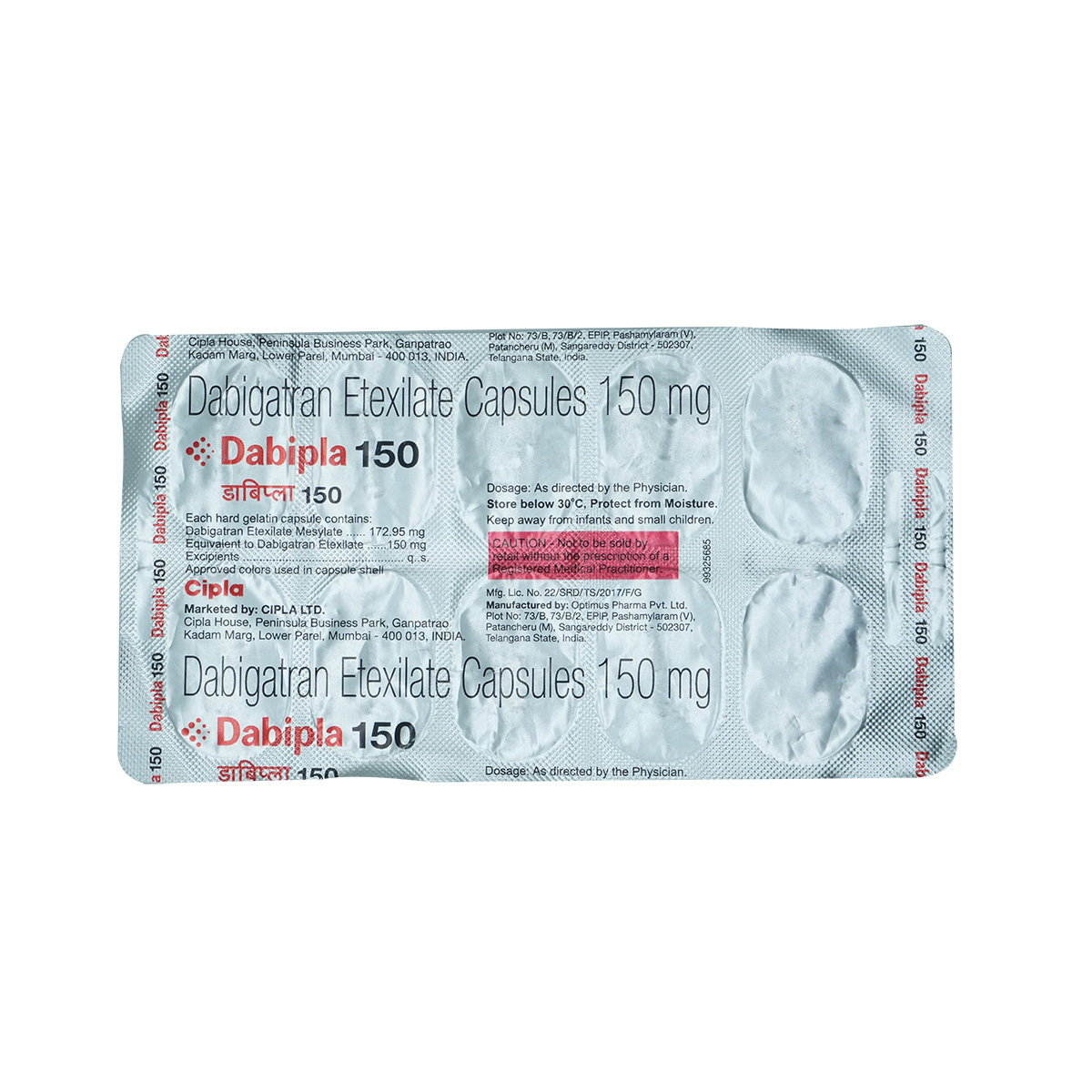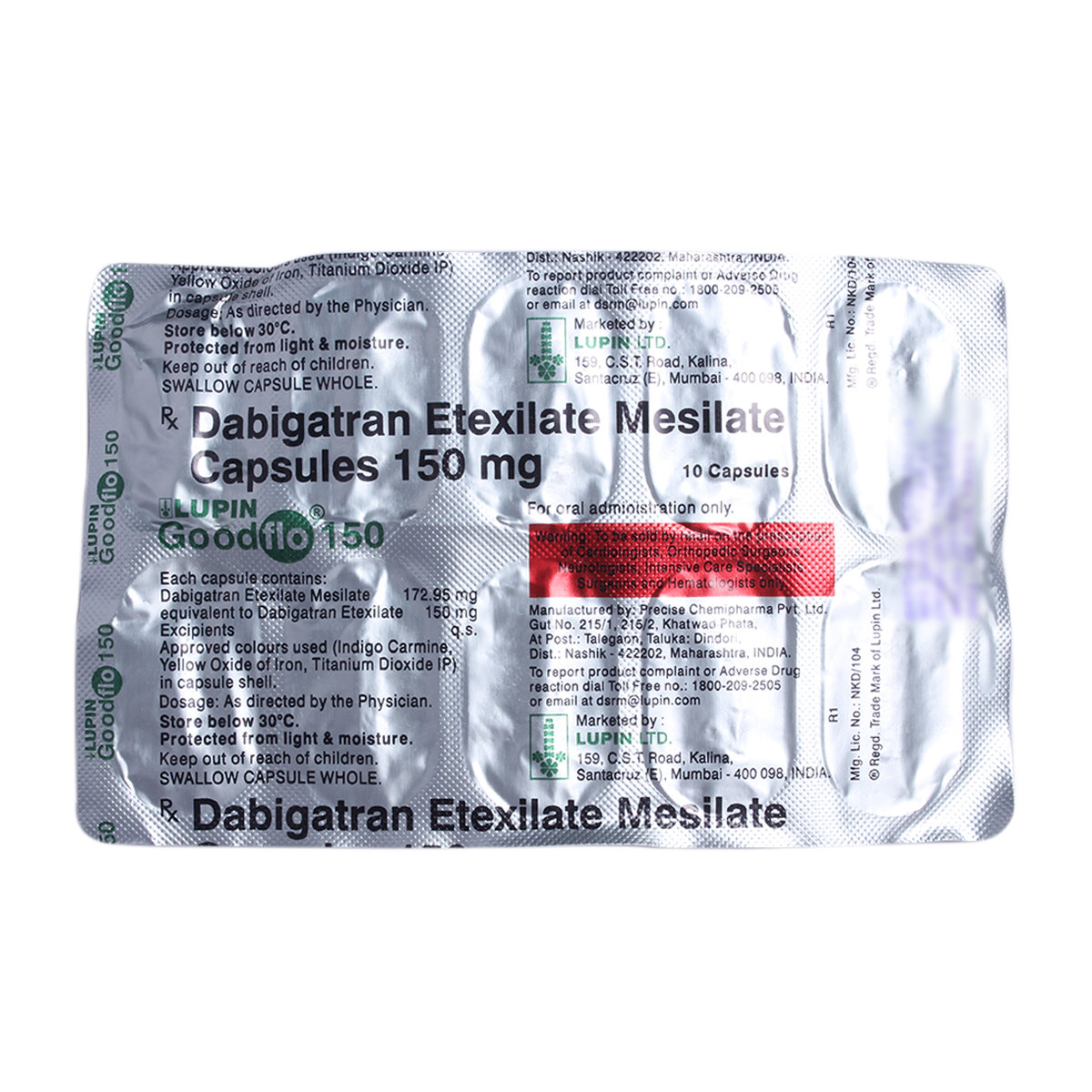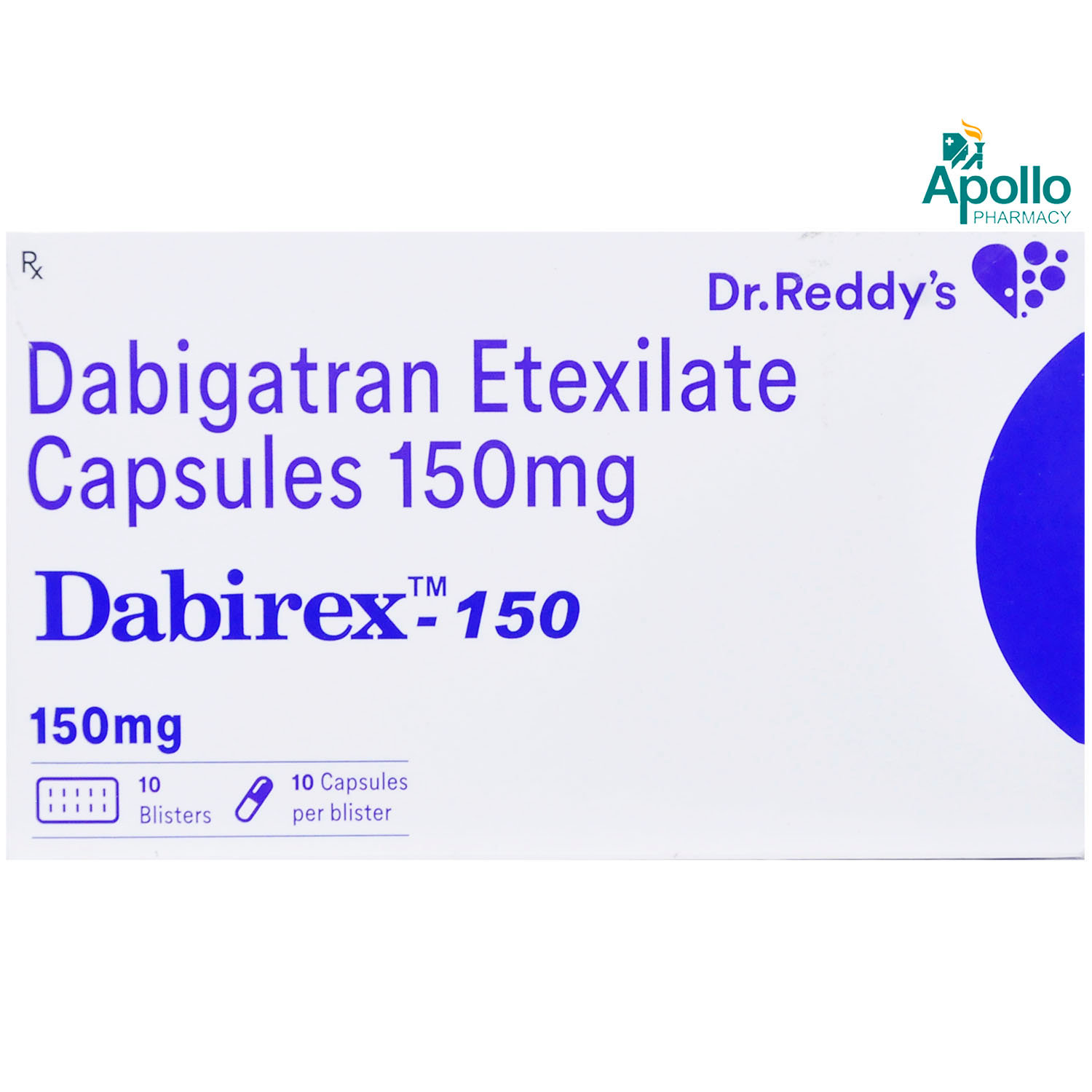Debijohn-150Mg Capsule 10'S
MRP ₹385
(Inclusive of all Taxes)
₹57.8 Cashback (15%)
Provide Delivery Location
Online payment accepted
 Prescription drug
Prescription drugWhats That
Composition :
Manufacturer/Marketer :
Consume Type :
Expires on or after :
Return Policy :
About Debijohn-150Mg Capsule
Debijohn-150Mg Capsule belongs to a class of drugs known as anticoagulants or blood thinners used to prevent and treat the risk of stroke, and heart attack in patients with atrial fibrillation (irregular heart rhythm), reducing blood clot formation. Besides this, it is also used to prevent deep vein thrombosis (blood clots in leg veins) and pulmonary embolism (blood clots in the lung) and reduces the risk of getting clots in people who have undergone knee or hip replacement surgeries.
Debijohn-150Mg Capsule contains ‘Dabigatran’, which works by inhibiting the production of clotting factors Xa called thrombin. This prevents the conversion of fibrinogen (soluble protein) to fibrin (insoluble protein), thereby preventing blood clot formation. It makes your blood flow easy through your veins, making it less likely to form a serious blood clot. So, an intake of Debijohn-150Mg Capsule helps prevent blood clots if you have an increased risk of having a heart attack, or stroke.
Take Debijohn-150Mg Capsule as prescribed by your doctor. You are advised to take Debijohn-150Mg Capsule for as long as your doctor has prescribed it for you, depending on your medical conditions. You may experience bleeding, anaemia (low number of red blood cells), and nausea, stomach pain, indigestion. Most of these side effects of Debijohn-150Mg Capsule do not require medical attention and gradually resolve over time. However, if the side effects are persistent, reach out to your doctor.
If you are known to be allergic to Debijohn-150Mg Capsule or any other medicines, please tell your doctor. If you are pregnant or breastfeeding, it is advised to consult a doctor before using Debijohn-150Mg Capsule . If you have a stomach ulcer, kidney or liver problems, high blood pressure, or bleeding problems, inform your doctor before taking Debijohn-150Mg Capsule . Try not to stop taking this medicine of your own. Stopping a sudden intake of Debijohn-150Mg Capsule may worsen your condition and increase your risk of cardiovascular death, heart attack, and stroke.
Uses of Debijohn-150Mg Capsule
Directions for Use
Key Benefits
Debijohn-150Mg Capsule belongs to a class of drugs known as anticoagulants or blood thinner. It prevents clot formation in the deep vein thrombosis (veins of the legs), pulmonary embolism (lungs), stroke (brain), and heart in patients with atrial fibrillation (irregular heart rhythm). Debijohn-150Mg Capsule is primarily used to prevent and treat the risk of stroke and heart attack by reducing blood clot formation. Besides this, it also reduces the risk of getting clots in people who have undergone knee or hip replacement surgeries. Debijohn-150Mg Capsule works by stopping the action of clotting factor (thrombin). This prevents the conversion of fibrinogen (soluble protein) to fibrin (insoluble protein), thereby preventing blood clots formation.
Storage
- Take medications with food (if recommended): It can help prevent stomach distress and indigestion.
- Eat smaller, more frequent meals: Divide daily food intake into smaller, more frequent meals to ease digestion.
- Avoid trigger foods: Identify and avoid foods that trigger indigestion, such as spicy, fatty, or acidic foods.
- Stay upright after eating: Sit or stand upright for at least 1-2 hours after eating to prevent stomach acid from flowing into the oesophagus.
- Avoid carbonated drinks: Avoid drinking carbonated beverages, such as soda or beer, which can worsen indigestion.
- Manage stress: To alleviate indigestion, engage in stress-reducing activities like deep breathing exercises or meditation.
- Consult a doctor if needed: If indigestion worsens or persists, consult a healthcare professional to adjust the medication regimen or explore alternative treatments.
- Drink water or other clear fluids.
- To prevent worsening of pain, limit intake of tea, coffee, or alcohol.
- Include bland foods like rice, toast, crackers, and rice in your diet.
- Avoid lying down immediately after eating as it may cause indigestion or heartburn.
- Avoid acidic and spicy food as it may cause indigestion.
- Avoid other medicines that increase the risk of bleeding.
- Use an electric razor and a soft-bristled toothbrush.
- Monitor for signs of bleeding like bleeding gums, unusual bruising, blood in stool, nosebleeds, or heavy menstrual bleeding.
- If you experience severe bleeding, apply direct pressure on the wound and consult a doctor promptly.
- If the risk of bleeding is high, discuss with your doctor about possibility of switching to different medicine with a lower bleeding risk.
- Inform Your Doctor: Notify your doctor immediately about your diarrhoea symptoms. This allows them to adjust your medication or provide guidance on managing side effects.
- Stay Hydrated: Drink plenty of fluids to replace lost water and electrolytes. Choose water, clear broth, and electrolyte-rich drinks. Avoid carbonated or caffeinated beverages to effectively rehydrate your body.
- Follow a Bland Diet: Eat easy-to-digest foods to help firm up your stool and settle your stomach. Try incorporating bananas, rice, applesauce, toast, plain crackers, and boiled vegetables into your diet.
- Avoid Trigger Foods: Steer clear of foods that can worsen diarrhoea, such as spicy, fatty, or greasy foods, high-fibre foods, and dairy products (especially if you're lactose intolerant).
- Practice Good Hygiene: Maintain good hygiene to prevent the spread of infection. To stay healthy, wash your hands frequently, clean and disinfect surfaces regularly, and avoid exchanging personal belongings with others.
- Take Anti-Diarrheal Medications: If your doctor advises, anti-diarrheal medications such as loperamide might help manage diarrhoea symptoms. Always follow your doctor's directions.
- Keep track of your diarrhoea symptoms. If they don't get better or worse or are accompanied by severe stomach pain, blood, or dehydration signs (like extreme thirst or dark urine), seek medical help.
Drug Warnings
If you are known to be allergic to Debijohn-150Mg Capsule or any other medicines, please tell your doctor. If you are pregnant or breastfeeding, it is advised to consult a doctor before using Debijohn-150Mg Capsule . Safety and effectiveness of Debijohn-150Mg Capsule have not been established, so its use should be avoided in pediatric patients or children less than 18 years of age. If you have a stomach ulcer, kidney or liver problems, high blood pressure, or bleeding problems, inform your doctor before taking Debijohn-150Mg Capsule . Try not to stop taking Debijohn-150Mg Capsule of your own. Stopping a sudden intake of Debijohn-150Mg Capsule may worsen your condition and increase your risk of cardiovascular death, heart attack, and stroke. Hence, you should consult a doctor before stopping the dose of Debijohn-150Mg Capsule . You should inform the doctor that you are taking Debijohn-150Mg Capsule before any surgery is scheduled. Debijohn-150Mg Capsule can cause a serious blood clot around your spinal cord if you undergo a spinal tap or receive spinal anesthesia (epidural). Avoid consumption of alcohol while taking Debijohn-150Mg Capsule as it may increase the risk of stomach bleeding.
Drug-Drug Interactions
Drug-Drug Interactions
Login/Sign Up
When Mifepristone is taken with Debijohn-150Mg Capsule, it may increase the risk of severe vaginal bleeding in women.
How to manage the interaction:
Taking Mifepristone with Debijohn-150Mg Capsule is not recommended, but it can be taken if prescribed by the doctor. However, if you experience heavy, persistent vaginal bleeding, consult the door. Do not stop using any medications without talking to a doctor.
Coadministration of Warfarin with Debijohn-150Mg Capsule can increase the risk of bleeding.
How to manage the interaction:
Although there is a possible interaction between Debijohn-150Mg Capsule and warfarin, you can take these medicines together if prescribed by a doctor. However, if you notice unusual bleeding or bruising, vomiting, blood in your urine or stools, headache, dizziness, or weakness, contact a doctor immediately. Do not stop using any medications without consulting a doctor.
Taking Debijohn-150Mg Capsule with Tinzaparin can increase the risk of bleeding leading to serious blood loss.
How to manage the interaction:
Taking Debijohn-150Mg Capsule with Tinzaparin together can possibly result in an interaction, but it can be taken if your doctor has advised it. However, if you experience unusual bleeding or bruising, dizziness, lightheadedness, red or black, tarry stools, coughing up or vomiting fresh or dried blood that looks like coffee grounds, severe headache, and weakness, consult the doctor. Do not stop using any medications without a doctor's advice.
Taking Debijohn-150Mg Capsule with Prasugrel can increase the risk of bleeding leading to serious blood loss.
How to manage the interaction:
Although taking Prasugrel and Debijohn-150Mg Capsule together can evidently cause an interaction, it can be taken if a doctor has suggested it. However, if you experience unusual bleeding or bruising, dizziness, lightheadedness, red or black, tarry stools, coughing up or vomiting fresh or dried blood that looks like coffee grounds, severe headache, and weakness, consult the doctor. Do not stop using any medications without a doctor's advice.
Taking Debijohn-150Mg Capsule with Abciximab can increase the risk of bleeding leading to serious blood loss.
How to manage the interaction:
Taking Debijohn-150Mg Capsule with Abciximab together can possibly result in an interaction, but it can be taken if your doctor has advised it. However, if you experience unusual bleeding or bruising, dizziness, lightheadedness, red or black, tarry stools, coughing up or vomiting fresh or dried blood that looks like coffee grounds, severe headache, and weakness, consult the doctor. Do not stop using any medications without a doctor's advice.
Coadministration of Piroxicam with Debijohn-150Mg Capsule can increase the risk of bleeding.
How to manage the interaction:
There may be a possibility of interaction between Piroxicam and Debijohn-150Mg Capsule, but it can be taken if prescribed by a doctor. However, if you experience unusual bleeding or bruising, dizziness, lightheadedness, red or black, tarry stools, coughing up or vomiting fresh or dried blood that looks like coffee grounds, severe headache, and weakness, consult the doctor. Do not stop using any medications without talking to a doctor.
Taking Debijohn-150Mg Capsule with Danaparoid can increase the risk of bleeding leading to serious blood loss.
How to manage the interaction:
Taking Debijohn-150Mg Capsule with Danaparoid together can possibly result in an interaction, but it can be taken if your doctor has advised it. However, if you experience unusual bleeding or bruising, dizziness, lightheadedness, red or black, tarry stools, coughing up or vomiting fresh or dried blood that looks like coffee grounds, severe headache, and weakness, consult the doctor. Do not stop using any medications without a doctor's advice.
When Debijohn-150Mg Capsule is taken with Dronedarone, the amount of Debijohn-150Mg Capsule in the blood can go up.
How to manage the interaction:
Taking Debijohn-150Mg Capsule with Dronedarone together can possibly result in an interaction, but it can be taken if your doctor has advised it. However, if you experience paleness, fatigue, dizziness, fainting, unusual bruising or bleeding, fever, chills, diarrhea, sore throat, muscle aches, breathing difficulty, blood in coughing fluid, red or inflamed skin, body sores, and pain or burning during urination, consult the doctor.
Taking Flurbiprofen with Debijohn-150Mg Capsule can increase the risk of bleeding and hemorrhage.
How to manage the interaction:
Although taking Flurbiprofen and Debijohn-150Mg Capsule together can evidently cause an interaction, it can be taken if your doctor has suggested it. If you experience bleeding, feeling dizzy or lightheaded, dark or sticky stools, throwing up blood, severe headache, or feeling weak contact your doctor immediately. Do not stop using any medications without first talking to your doctor.
Taking Debijohn-150Mg Capsule with Ticlopidine can increase the risk of bleeding leading to serious blood loss.
How to manage the interaction:
Taking Debijohn-150Mg Capsule with Ticlopidine together can possibly result in an interaction, but it can be taken if your doctor has advised it. However, if you experience unusual bleeding or bruising, dizziness, lightheadedness, red or black, tarry stools, coughing up or vomiting fresh or dried blood that looks like coffee grounds, severe headache, and weakness, consult the doctor. Do not stop using any medications without a doctor's advice.
Drug-Food Interactions
Drug-Food Interactions
Login/Sign Up
St. John’S Wort, Garlic Pill
How to manage the interaction:
Herbs and supplements may interact with Debijohn-150Mg Capsule. Avoid St. John's Wort, herbs including garlic, ginger, bilberry, danshen, piracetam, and ginkgo biloba during Debijohn-150Mg Capsule treatment.
Diet & Lifestyle Advise
- Take the medication as directed by the doctor and at regular intervals. Do not use other over the counter medications, herbal or vitamin supplements without informing your pharmacist or doctor when you take Debijohn-150Mg Capsule .
- Keep your cholesterol and triglyceride levels under control.
- Eat at regular intervals, and maintain a healthy diet that includes fresh fruits, vegetables.
- Limit alcohol intake since it raises blood pressure and increases the risk of heart diseases.
- Keep a check on your weight and exercise regularly to keep your heart healthy.
- Your doctor also guides you on how to notice and manage the early symptoms of detecting heart diseases.
Side Effects of Debijohn-150Mg Capsule
- Stomach pain
- Indigestion
- Bleeding
- Anemia (low number of red blood cells)
- Nausea
- Diarrhea
Habit Forming
Therapeutic Class
All Substitutes & Brand Comparisons
RX
Dabigo 150 mg Capsule 10's
Sun Pharmaceutical Industries Ltd
₹165.5
(₹14.9 per unit)
56% CHEAPERRX
Out of StockDabipla 150 Capsule 10's
Cipla Ltd
₹314.5
(₹28.31 per unit)
18% CHEAPERRX
Goodflo 150 Capsule 10's
Lupin Ltd
₹324
(₹29.16 per unit)
15% CHEAPER
Author Details
We provide you with authentic, trustworthy and relevant information
Drug-Diseases Interactions
Drug-Diseases Interactions
Login/Sign Up
FAQs
Drug-Drug Interactions Checker List
- WARFARIN
- PHENPROCOUMON
- ACENOCOUMAROL
- HEPARIN
- CLOPIDOGREL
- PRASUGREL
- TICAGRELOR
- RIVAROXABAN
- AMIODARONE
- DRONEDARONE
- QUINIDINE
- VERAMAPIL
- KETOCONAZOLE
- ITRACONAZOLE
- TACROLIMUS
- CYCLOSPORINE
- LOPINAVIR
- RITONAVIR
- GLECAPREVIR
- PIBRENTASVIR
- RIFAMPICIN
- CLARITHROMYCIN
- ASPIRIN
- IBUPROFEN
- DICLOFENAC
- CARBAMAZEPINE
- PHENYTOIN
Special Advise
You should have regular platelet count, factor V assay, fibrinogen level test, prothrombin time test (PT or PT-INR), and the INR, or international normalized ratio to analyze your blood clotting time.
Disease/Condition Glossary
A blood clot can occur in any part of the body that can lead to a heart attack, stroke, and damage to organs (even coma or death). Blood clots can reach your arteries or veins in the organs like the brain, kidney, heart, lungs, and limbs. Conditions like atherosclerosis, diabetes, heart failure, irregular heartbeat (arrhythmia), and obesity/overweight can trigger excessive blood clotting in the brain and heart. On the other hand, deep vein thrombosis (blood clot in veins), peripheral artery disease (narrowed arteries due to fat deposit or blood clot), and atherosclerosis (fat build upon the walls of the arteries) can cause a blood clot in your limbs.

Have a query?
Alcohol
Safe if prescribed
You are recommended to avoid consumption of alcohol with Debijohn-150Mg Capsule as it may increase the risk of bleeding.
Pregnancy
Consult your doctor
Debijohn-150Mg Capsule is unsafe to use during pregnancy since it affects the foetus. Please consult your doctor if you are planning to become pregnant or already pregnant before starting Debijohn-150Mg Capsule .
Breast Feeding
Consult your doctor
There is limited data on how Debijohn-150Mg Capsule affects breastfeeding. However, it is unsafe to use Debijohn-150Mg Capsule if you are lactating, since it passes through the breast milk and harm the baby. Please consult your doctor before starting Debijohn-150Mg Capsule .
Driving
Safe if prescribed
Debijohn-150Mg Capsule usually does not affect your ability to drive or operate machinery.
Liver
Consult your doctor
Let your doctor know if you have any history of liver diseases or hepatic impairment. Your doctor will weigh the benefits and potential risks before prescribing Debijohn-150Mg Capsule . However, it is not recommended in patients with severe liver diseases.
Kidney
Consult your doctor
Let your doctor know if you have any history of kidney diseases. Your doctor will weigh the benefits and potential risks before prescribing Debijohn-150Mg Capsule . However, it is not recommended in patients with severe kidney diseases.
Children
Safe if prescribed
Debijohn-150Mg Capsule is not recommended for children below the age of 18 years. The safety and efficacy of Debijohn-150Mg Capsule have not been established in children.










